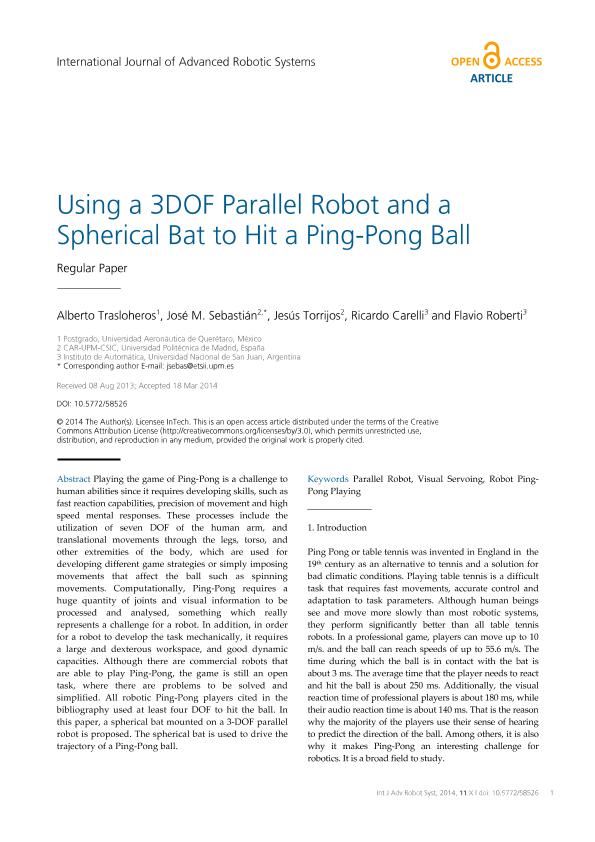Mostrar el registro sencillo del ítem
dc.contributor.author
Trasloheros, Alberto
dc.contributor.author
Sebastián, José María
dc.contributor.author
Torrijos, Jesús
dc.contributor.author
Carelli Albarracin, Ricardo Oscar

dc.contributor.author
Roberti, Flavio

dc.date.available
2018-01-15T20:59:51Z
dc.date.issued
2014-03
dc.identifier.citation
Torrijos, Jesús; Carelli Albarracin, Ricardo Oscar; Trasloheros, Alberto; Roberti, Flavio; Sebastián, José María; Using a 3DOF Parallel Robot and a Spherical Bat to hit a Ping-Pong Ball; Sage Publications; International Journal of Advanced Robotic Systems; 11; 5; 3-2014; 1-12
dc.identifier.issn
1729-8806
dc.identifier.uri
http://hdl.handle.net/11336/33365
dc.description.abstract
Playing the game of Ping-Pong is a challenge to human abilities since it requires developing skills, such as fast reaction capabilities, precision of movement and high speed mental responses. These processes include the utilization of seven DOF of the human arm, and translational movements through the legs, torso, and other extremities of the body, which are used for developing different game strategies or simply imposing movements that affect the ball such as spinning movements. Computationally, Ping-Pong requires a huge quantity of joints and visual information to be processed and analysed, something which really represents a challenge for a robot. In addition, in order for a robot to develop the task mechanically, it requires a large and dexterous workspace, and good dynamic capacities. Although there are commercial robots that are able to play Ping-Pong, the game is still an open task, where there are problems to be solved and simplified. All robotic Ping-Pong players cited in the bibliography used at least four DOF to hit the ball. In this paper, a spherical bat mounted on a 3-DOF parallel robot is proposed. The spherical bat is used to drive the trajectory of a Ping-Pong ball.
dc.format
application/pdf
dc.language.iso
eng
dc.publisher
Sage Publications

dc.rights
info:eu-repo/semantics/openAccess
dc.rights.uri
https://creativecommons.org/licenses/by/2.5/ar/
dc.subject
Parallel Robot
dc.subject
Visual Servoing
dc.subject
Robot Ping- Pong Playing
dc.subject.classification
Ingeniería de Sistemas y Comunicaciones

dc.subject.classification
Ingeniería Eléctrica, Ingeniería Electrónica e Ingeniería de la Información

dc.subject.classification
INGENIERÍAS Y TECNOLOGÍAS

dc.title
Using a 3DOF Parallel Robot and a Spherical Bat to hit a Ping-Pong Ball
dc.type
info:eu-repo/semantics/article
dc.type
info:ar-repo/semantics/artículo
dc.type
info:eu-repo/semantics/publishedVersion
dc.date.updated
2018-01-11T13:49:53Z
dc.identifier.eissn
1729-8814
dc.journal.volume
11
dc.journal.number
5
dc.journal.pagination
1-12
dc.journal.pais
Estados Unidos

dc.journal.ciudad
Thousand Oaks
dc.description.fil
Fil: Trasloheros, Alberto. Universidad Aeronáutica de Querétaro; México
dc.description.fil
Fil: Sebastián, José María. Universidad Politécnica de Madrid; España. Consejo Superior de Investigaciones Científicas; España
dc.description.fil
Fil: Torrijos, Jesús. Consejo Superior de Investigaciones Científicas; España. Universidad Politécnica de Madrid; España
dc.description.fil
Fil: Carelli Albarracin, Ricardo Oscar. Consejo Nacional de Investigaciones Científicas y Técnicas. Centro Científico Tecnológico Conicet - San Juan. Instituto de Automática. Universidad Nacional de San Juan. Facultad de Ingeniería. Instituto de Automática; Argentina
dc.description.fil
Fil: Roberti, Flavio. Consejo Nacional de Investigaciones Científicas y Técnicas. Centro Científico Tecnológico Conicet - San Juan. Instituto de Automática. Universidad Nacional de San Juan. Facultad de Ingeniería. Instituto de Automática; Argentina
dc.journal.title
International Journal of Advanced Robotic Systems

dc.relation.alternativeid
info:eu-repo/semantics/altIdentifier/url/http://www.intechopen.com/journals/international_journal_of_advanced_robotic_systems
dc.relation.alternativeid
info:eu-repo/semantics/altIdentifier/doi/http://dx.doi.org/10.5772/58526
Archivos asociados
